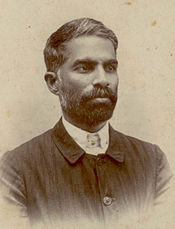- Dharmananda Damodar Kosambi
-
For the Indian mathematican and historian, see Damodar Dharmananda Kosambi.
Dharmananda D. Kosambi 
Born October 9, 1876
Sanhkval, GoaDied June 24, 1947
SevagramOccupation Buddhist scholar and Pāli language expert Acharya Dharmananda Damodar Kosambi (October 9, 1876 – June 24, 1947) was a prominent Buddhist scholar and a Pāli language expert. He was the father of the illustrious mathematician and prominent Marxist historian, Damodar Dharmananda Kosambi.
Kosambi was born in the Sankhval village of Goa in 1876. He was married at the age of sixteen.[1] He was passionately interested in knowledge and felt that married life would not allow him to pursure this goal. He thus attempted to leave home several times, but lacked the courage to do so and he returned to his family. However, after the birth of his first daughter, Manik, he did leave his family not returning for nearly four years. Needless to say, his wife, Balabai, suffered during these years, as it was uncommon at the time for a married man to leave his wife and family. Later, Kosambi traveled to Varanasi and Nepal, as he wanted to study Buddhism in its original language, Pāli. However, he was rather disappointed in what he learned there and insteady travelled to Calcutta and then on to Ceylon (Sri Lanka), where he was admitted to Vidyodaya University. He studied there for three years and was ordained as a Buddhist monk in 1902. Later, he went to Burma (Myanmar) and undertook comparative study of Buddhist texts in Burmese language. After spending seven years abroad, Kosambi returned to India.
He started working as a reader at the University of Calcutta and brought his wife and daughter Manik to Calcutta. His son Damodar was born in 1907. Later, Dharmananda gave up his university job to work as a research fellow in Baroda. Later, he started lecturing all over Western India, and finally moved to Fergusson College in Pune. In Bombay, he met Dr. James Woods from Harvard University, who was seeking a scholar adept in Sanskrit, Ardhamagadhi, and Pāli. Woods invited Kosambi to Harvard, to complete the task of compiling a critical edition of Visuddhimagga, a book on Buddhist philosophy. At Harvard, Kosambi learned Russian and became very interested in Marxism. He travelled went to the USSR in 1929 and taught Pāli at Leningrad University.[1]
When the Indian independence movement was at its peak, Kosambi returned to India and taught at Gujarat University without any remuneration. He also started recruiting volunteers for Salt Satyagraha. He was imprisoned for six years for participating in the Salt Satyagraha, which certainly took a toll on his health.[1]
Dr. B.R. Ambedkar got to know Acharya Kosambi during Indian's fight for independence, and Kosambi's influence on him played a part in Ambedkar's decision to convert to Buddhism when he decided to change his religion.
Besides Buddhist works, Kosambi also studied and translated many Jain works. Later, Kosambi founded Bahujanavihara, a shelter house for Buddhist monks in Bombay, which exists to this day. Under the influence of Jainism, he decided to give up life through sallekhana (voluntary fasting). Gandhiji requested that he move to Wardha for naturopathy and reconsider his decision to fast unto death. He moved to Sevagram, near Wardha, but kept his diet to a spoon of bitter gourd (karela) juice in order to respect Gandhi's wishes. He wanted to die on Buddha Pournima but lived beyond it for a few days. The end came after 30 days of fasting in June 1947.
Works
He authored one of the most popular biographies of Buddha, Bhagwan Buddha (1940) in Marathi..[2] It was later translated in English and in other Indian languages by Central Sahitya Akademi. Besides Bhagwan Buddha, Kosambi also authored eleven books on Buddhism and Jainism. His autobiography, written in Marathi, is called Nivedan
References
- ^ a b c "Acharya Kosambi". http://www.kamat.com/kalranga/itihas/4444.htm. Retrieved 2006-12-07.
- ^ "Buddhism's Revival in India in the 20th Century". http://www.sscnet.ucla.edu/southasia/Religions/paths/BuddhismRevival.doc. Retrieved 2006-12-07.
External links
- The making of an Indologist at www.hinduonnet.com
- Dileep Padgaonkar (Sep 25, 2010). "Scholars Extraordinary". The Times of India. http://timesofindia.indiatimes.com/home/opinion/edit-page/Scholars-Extraordinary/articleshow/6621118.cms.
Categories:- Marathi-language writers
- Harvard University alumni
- 1876 births
- 1947 deaths
- University of Calcutta faculty
- Saint Petersburg State University faculty
- Santhara
Wikimedia Foundation. 2010.
